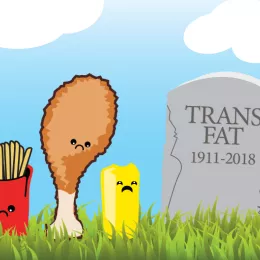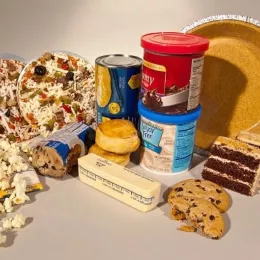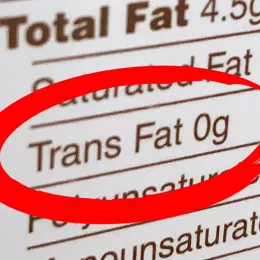Chemical Cuisine Rating
Avoid
Purpose: Oil Substitute
Health Concerns: Cardiovascular
Found in: Fat, oil, shortening: Stick margarine, crackers, fried restaurant foods, baked goods, icing, microwave popcorn
Vegetable oil, usually a liquid, can be made into a semi-solid shortening by reacting it with hydrogen. Partial hydrogenation reduces the levels of polyunsaturated oils – and also creates trans fats, which promote heart disease. A committee of the U.S. Food and Drug Administration (FDA) concluded in 2004 that on a gram-for-gram basis, trans fat is even more harmful than saturated fat. That finding encouraged a few food manufacturers to begin replacing hydrogenated shortening with less-harmful ingredients. Similarly, the Institute of Medicine advised consumers to consume as little trans fat as possible, ideally less than about 2 grams a day (that much might come from naturally occurring trans fat in beef and dairy products). Harvard School of Public Health researchers estimate that trans fat had been causing about 50,000 premature heart attack deaths annually, making partially hydrogenated oil one of the most harmful ingredients in the food supply (see discussion of salt).
Beginning in 2006, Nutrition Facts labels have had to list the amount of trans fat in a serving. That spurred many more companies, including Frito-Lay, Kraft, ConAgra, and others, to replace most or all of the partially hydrogenated oil in almost all their products. The substitutes are invariably more healthful, and the total of saturated plus trans fat (which both boost the “bad” LDL cholesterol when replaced by polyunsaturated vegetable oils) is generally no higher than it was before companies switched. Confusing label reading, though, is that foods labeled "0g trans fat" are permitted to contain 0.5g of trans fat per serving, while "no trans fat" means none at all. Consumers need to read labels carefully for another reason: foods labeled "0g trans" or "no trans" may still have large amounts of saturated fat.
Restaurants, which do not provide nutrition information, were slower to change, but the pace of change has picked up. They use partially hydrogenated oil for frying chicken, potatoes, and fish, as well as in biscuits and other baked goods. By 2016, McDonald's, Wendy's, KFC, Taco Bell, Ruby Tuesday, Red Lobster, and other large chains, and most smaller restaurants, eliminated trans fat.
Denmark virtually banned partially hydrogenated oil as of January 1, 2004. Later that year, the Center for Science in the Public Interest petitioned the FDA to require restaurants to disclose when they use partially hydrogenated oil and to begin the process of eliminating partially hydrogenated oil from the entire food supply. While the FDA rejected the idea of requiring restaurants to disclose the presence of trans fat, New York City, Philadelphia, Boston, and other jurisdictions have set tight limits on the trans-fat content of restaurant foods. Meanwhile, Austria, Hungary, Iceland, Norway, and Switzerland adopted Denmark-like restrictions.
In 2013 the FDA responded to CSPI's petition to revoke the legal status of partially hydrogenated oil (the FDA considered that oil to be "generally recognized as safe," even though it and everyone else considers it to be "generally recognized as dangerous”) by proposing that that oil be eliminated from the food supply. In 2015 the FDA finally concluded that partially hydrogenated oil was no longer safe and gave the food industry three years to eliminate it from its products. Already the industry has replaced about seven billion pounds of the manufactured oil, and FDA’s action will spur companies to eliminate the remaining billion pounds. Still, the Grocery Manufacturers Association, the industry’s largest trade association, has petitioned the FDA to approve numerous small uses of partially hydrogenated oil.
Back to Chemical Cuisine









